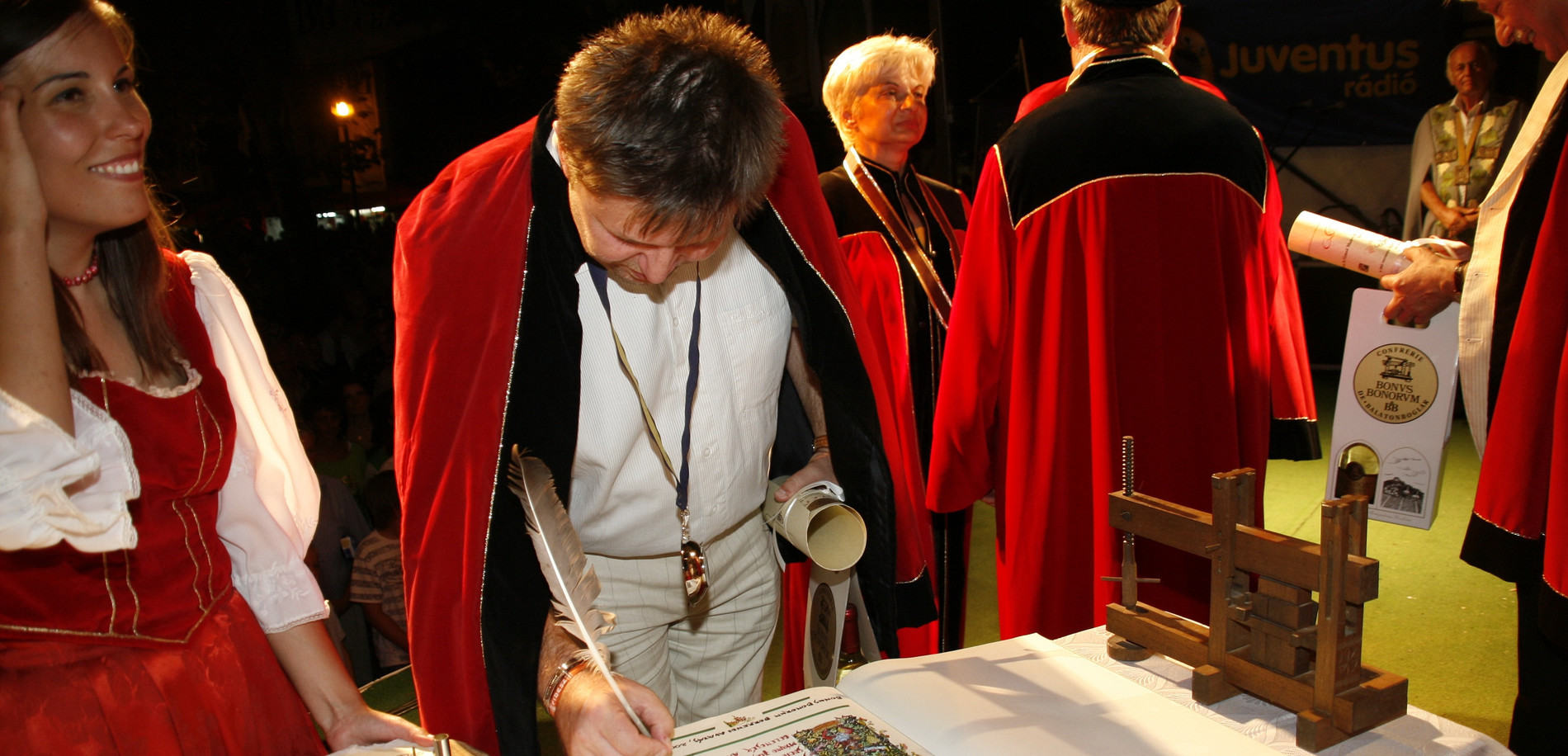General Information About Wine Brotherhoods
The grape and the beverage made from it, wine, are an integral part of human culture and civilization and a very important area of the economy. It is no wonder that humans created gods and organizations to protect wine.
The most important of these organizations are the wine brotherhoods. It is worth knowing about their history that they were first created in the Middle Ages in German and French areas, in Alsace and Lorraine. Vineyard workers formed guilds in Hungary in the 1600s in order to safeguard their interests. Wine brotherhoods began to experience a renaissance in Western Europe in the 1960s and in Hungary in the 1970s. The purpose of the wine brotherhoods is not only to protect wine, but to make the consumption of wine knowledgeable and refined. In every wine region in Hungary one can find a wine brotherhood that reflects the unique character of that region. Their ceremonial dress, emblems, and banners indicate their bond. Every wine brotherhood has its flagship wine. The brotherhoods have ceremonies every year in which they induct new members.
Since 1964, the wine brotherhoods of the world have been organizing themselves into the International Association of Bacchic Wine Brotherhoods. The headquarter are in Paris.
![]()
Bonus Bonorum, the Balatonboglár Wine Brotherhood
The Balatonboglár Wine Brotherhood was founded in 1986. Bonus Bonorum is a Latin expression that means the best of the best. The ceremonial dress for the Balatonboglár Wine Brotherhood was designed by the costume designers in Budapest's Vígszínház (Comedy Theater). The knights' robes are made of red velvet with black and gold trim. The image of a winepress made in 1736 appears on their emblem. A black Hungarian cap accompanies the men's garments. In the brotherhood, however, women play the main role. How is this so? The answer to this question can be grasped by reading the legend of Emese, which can be found in the following chapter.
The Brotherhood's Purpose:
To make people conscious of the fact that wine is not the same as alcohol.
To promote and spread knowledgeable and refined consumption of wine as the only acceptable instrument in a struggle against alcoholism. To pass on the traditions of viniculture and viticulture to the next generations.
Flagship wine of Bonus Bonorum is the famous Boglári Muskotály. Every year, new members are publicly inducted into the brotherhood at the time of the Boglár Harvest Festival. The brotherhood has 40 permanent and 160 honorary members.
Prominent members of the Balatonboglár Wine Brotherhood
- Róbert Cey-Bert: member of the International Wine Academy
- Demis Roussos: singer, musician
- Ferenc Demjén: songwriter, singer
- Dr. György Bálint: agricultural expert
- Dr. Endre Czeizel: geneticist
- Dr. Wielhelm Klapsch: journalist (Germany)
- Péter Feledi: television journalist
- Fred Shows: wine dealer (USA)
- Hemant D. Kotecha: wine importer (United Kingdom)
- Jean-Paul de Bermis: French marquis (France)
- M. André D. Bonin: honorary chairman of the International Association of Bacchic Wine Brotherhoods (France)
- Mary O’Bryen: journalist (United States of America)
- Lord Montagu of Beonlion: English lord (United Kingdom)
- Endre Papp: television journalist
- Jean-Niklas Palm-Jensen
![]()
The Legend of Emese
It is well known that the southern shore of Lake Balaton has been one of Hungary's flourishing wine regions for a long time. This is eloquently attested by sixteenth century documents. Later, the expansion of the Ottoman Empire caused tremendous damage to the flourishing viniculture and viticulture. The conquerors laid waste the countryside, plundered farms and villages, and slaughtered part of the local population.
One day the Turks threatened to attack the village of Boglár. When news of their approach reached the people, many of them fled into the marshes around the lake. Only a few remained at home. Emese, one of the most beautiful and most intelligent women in the village, was one of them. She wanted to save the village and its people from devastation and plunder. The young woman's courage, beauty, and gallantry surprised the Turks. Even the vizier asked the pasha to show mercy to the people of the village. The pasha finally agreed, but he insisted on strange conditions in return for his mercy, saying, "If the beautiful Hungarian woman is able to recognize the wine of her village from among the other wines served her, the lives of the villagers will be spared." Knowing this, Emese secretly met with the serving men and got them to pour from the muscat cask. From the muscat that had been made in the vicinity of the village for a long time. She knew that she could distinguish the Boglár muscat from any other wine. That is why the Turks made the test more difficult. Emese had to taste the wines with her eyes blindfolded. She nevertheless easily chose the wonderfully fine Boglár muscat with the delicate flavor. The pasha rewarded her handsomely and actually showed mercy to the people of the village. In the end, the army withdrew with a huge cart of muscat wine - much to the delight of the people. There was a wild celebration in Boglár in honor of the heroic Emese, the effect of the Boglár muscat, and their freedom.




